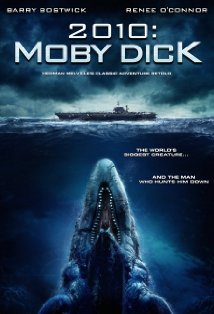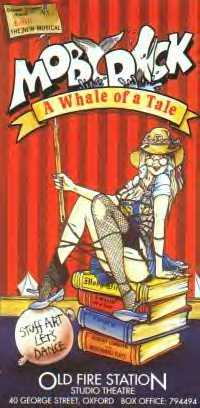
Moby-Dick; or, The Whale is an 1851 novel by American writer Herman Melville. The book is the sailor Ishmael's narrative of the maniacal quest of Ahab, captain of the whaling ship Pequod, for vengeance against Moby Dick, the giant white sperm whale that crippled him on the ship's previous voyage. A contribution to the literature of the American Renaissance, Moby-Dick was published to mixed reviews, was a commercial failure, and was out of print at the time of the author's death in 1891. Its reputation as a "Great American Novel" was established only in the 20th century, after the 1919 centennial of its author's birth. William Faulkner said he wished he had written the book himself, and D. H. Lawrence called it "one of the strangest and most wonderful books in the world" and "the greatest book of the sea ever written". Its opening sentence, "Call me Ishmael", is among world literature's most famous.

Ishmael is a character in Herman Melville's Moby-Dick (1851), which opens with the line, "Call me Ishmael." He is the first person narrator in much of the book. Because Ishmael plays a minor role in the plot, early critics of Moby-Dick assumed that Captain Ahab was the protagonist. Many either confused Ishmael with Melville or overlooked the role he played. Later critics distinguished Ishmael from Melville, and some saw his mystic and speculative consciousness as the novel's central force rather than Captain Ahab's monomaniacal force of will.

Queequeg is a character in the 1851 novel Moby-Dick by American author Herman Melville. The son of a South Sea chieftain who left home to explore the world, Queequeg is the first principal character encountered by the narrator, Ishmael. The quick friendship and relationship of equality between the tattooed cannibal and the white sailor show Melville's basic theme of shipboard democracy as well as his fondness for Polynesians. Once aboard the whaling ship Pequod, Queequeg becomes the harpooner for the mate Starbuck.

Pequod is a fictional 19th-century Nantucket whaling ship that appears in the 1851 novel Moby-Dick by American author Herman Melville. Pequod and her crew, commanded by Captain Ahab, are central to the story, which, after the initial chapters, takes place almost entirely aboard the ship during a three-year whaling expedition in the Atlantic, Indian and South Pacific oceans. Most of the characters in the novel are part of Pequod's crew.

Moby Dick is a 1956 color film adaptation of Herman Melville's 1851 novel Moby-Dick. It was directed by John Huston with a screenplay by Huston and Ray Bradbury. The film starred Gregory Peck, Richard Basehart, and Leo Genn.
Moby-Dick is an 1851 novel by Herman Melville that describes the voyage of the whaleship Pequod, led by Captain Ahab, who leads his crew on a hunt for the whale Moby Dick. There have been a number of adaptations of Moby-Dick in various media.

Mount Ahab is a conspicuous mountain 925 metres (3,035 ft) high that rises between the lower ends of Mapple Glacier and Melville Glacier on the east coast of Graham Land. The mountain was roughly surveyed in 1947 by Falkland Islands Dependencies Survey and was resurveyed in 1955. The name was repositioned following a survey by the British Antarctic Survey in 1962. It was named by the United Kingdom Antarctic Place-Names Committee after Captain Ahab of the whaler Pequod - the central character in Herman Melville's 1851 novel Moby-Dick.

Moby Dick is a 1930 American pre-Code film from Warner Bros., directed by Lloyd Bacon, and starring John Barrymore, Joan Bennett and Walter Lang. The film is a sound remake of the 1926 silent movie, The Sea Beast, which also starred Barrymore. It is the first adaption film of Herman Melville's 1851 novel Moby Dick which includes a soundtrack.

Moby-Dick is an American opera in two acts, with music by Jake Heggie and libretto by Gene Scheer, adapted from Herman Melville's 1851 novel Moby-Dick. The opera received its premiere at Dallas Opera in Dallas, Texas, on 30 April 2010. Heggie dedicated the opera to Stephen Sondheim.

Moby Dick is a 2010 film adaptation of Herman Melville's 1851 novel Moby-Dick. The film is an Asylum production, and stars Barry Bostwick as Captain Ahab. It also stars Renee O'Connor, Michael B. Teh, and Adam Grimes and is directed by Trey Stokes.

Age of the Dragons is a 2011 fantasy film directed by Ryan Little and starring Danny Glover and Vinnie Jones. A fantasy-themed reimagining of Herman Melville's classic 1851 novel, Moby Dick, it was released in the United Kingdom on March 4, 2011.

Melville Glacier is a glacier, 12 nautical miles (22 km) long, between Mapple Glacier and Pequod Glacier on the east coast of Graham Land, Antarctica. It flows eastwards between Stevrek Ridge and Parlichev Ridge in the Aristotle Mountains, to enter Domlyan Bay in the Weddell Sea. It was surveyed by the Falkland Islands Dependencies Survey in 1947 and 1955, and was named by the UK Antarctic Place-Names Committee after Herman Melville, the author of the 1851 novel Moby-Dick. Several other features in the area, such as Mount Ahab, are named after characters in the story.
Moby Dick is a Canadian-German television miniseries based on Herman Melville's 1851 novel of the same name, produced by Tele München Gruppe, with Gate Film, In association with RTH/ORF. Starring William Hurt as Captain Ahab, it was directed by Mike Barker with a screenplay by Nigel Williams. The cast also includes Ethan Hawke as Starbuck, Charlie Cox as Ishmael, Eddie Marsan as Stubb, Gillian Anderson as Ahab's wife, Elizabeth and Donald Sutherland as Father Mapple.

Moby Dick is a 1998 American television miniseries based on Herman Melville's 1851 novel of the same name. It was filmed in Australia in 1997 and first released in the United States in 1998. The miniseries consisted of two episodes, each running two hours with commercials on March 15 and 16 of 1998 on the USA Network. This is Gregory Peck's final on-screen role.

Captain Ahab is a fictional character and one of the main protagonists in Herman Melville's Moby-Dick (1851). He is the monomaniacal captain of the whaling ship Pequod. On a previous voyage, the white whale Moby Dick bit off Ahab's leg, and he now wears a prosthetic leg made out of whalebone. The whaling voyage of the Pequod ends up as a hunt for revenge on the whale, as Ahab forces the crew members to support his fanatical mission. When Moby Dick is finally sighted, Ahab's hatred robs him of all caution, and the whale drags him to his death beneath the sea and sinks the Pequod.
Father Mapple is a fictional character in Herman Melville's novel Moby-Dick (1851). A former whaler, he has become a preacher in the New Bedford Whaleman's Chapel. Ishmael, the narrator of the novel, hears Mapple's sermon on the subject of Jonah, who was swallowed by a whale but did not turn against God.

Moby Dick is a sperm whale who is the main antagonist in Herman Melville's 1851 novel of the same name. Melville based the whale partially on a real albino whale of that period called Mocha Dick.
Bulkington is a character in Herman Melville's 1851 novel Moby-Dick. Bulkington is referred to only by his last name and appears only twice, briefly in Chapter 3, "The Spouter Inn", and then in Chapter 23, "The Lee Shore", a short chapter of several hundred words devoted entirely to him.
Pip, short for Pippin, is the African-American cabin-boy on the whaling-ship Pequod in Herman Melville's 1851 novel, Moby-Dick. When Pip falls overboard he is left stranded in the sea, and rescued only by chance and becomes "mad." The book's narrator, Ishmael, however, thinks that this "madness" gives Pip the power to see the world as it is. Pip is first described as "insignificant," but is the only member of the crew to awaken feelings of humanity in Ahab, the ship's monomaniacal captain.












